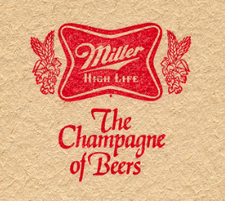|
|
|
Scale-wise, down is the new up. Get it?
In service of irony
All this aims to make use of irony, the inverted dramatic technique of displaying one reality, while describing its opposite. The audience is required not just to listen or watch; it must listen and watch. And then appreciate that what's seen and what's heard are intentionally opposite. The viewer is supposed to take all this in, process it, and understand the point.
Sound like more effort than most people devote to advertising? It is.
When it comes to beer advertising, the audience pays scant attention in the first place. On TV, YouTube, or wherever, ads appear as a mildly annoying interruption to entertainment. Further conspiring against the appreciation of subtle, intellectually involved techniques, ads often appear without sound, as when they're viewed in a crowded bar or some other noisy setting. Few viewers hang on each commercial message. Fewer still invest the mental energy dramatic irony requires. This sort of subtlety in advertising is like an extra sesame seed on a Big Mac. Nobody's gonna notice.
And therein lies just the start of Miller High Life's difficulties.
An element of surprise can be important in advertising. In this case, the surprise is muted at best. The ads show ordinary folks engaged in profoundly unsurprising activities. (Oddly, sister-brand Miller Lite's "celebration of ordinary" ad, reviewed earlier, goes the same route.) In order to deliver on the irony, the only surprising aspect of the sale gets relegated to the audio when, or more accurately, if the viewer listens carefully.
Setting aside surprise, the ad's irony also conspires against clarity, a must-have element for effective advertising. Employing one message in the video and its opposite in the audio is the antithesis of clear messaging. Sadly, many an ad-agency creative director will choose technique over clarity every time on their personal advertising-preference list. But clients should know better.
It gets still worse.
 Just a punch line?
Just a punch line?
A flawed ad idea that ends by making a joke of the brand's distinctiveness is an embarrassment. And it won't sell beer.
That the Miller marketing brain trust spent a good deal of the brewery's money producing the ad is its final irony, albeit unintended.




 RSS Feed
RSS Feed
